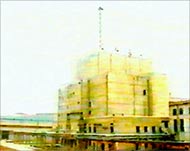Koreas hopeful on nuclear talks
North and South Korean delegations to this week’s six-party talks on Pyongyang’s nuclear ambitions have agreed at a meeting that solid progress needs to be made during the upcoming discussions. &nbs

The latest round of six-nation talks, also involving the United States, China, Japan and Russia, were set to begin on Tuesday. The Japanese delegation arrived on Sunday night.
The 100-minute meeting on Sunday was led by South Korean Deputy Foreign Minister Song Min-soon and his North Korean counterpart, Kim Kye Gwan, said Bae Young-han, a spokesman for the delegation from Seoul.
“They have agreed on the need to make substantial Progress” at this round of talks, said Bae, the director general for press and public relations at South Korea’s Foreign Ministry.
He said the delegates discussed “many issues” but would not give any details.
South Korea’s Yonhap news agency cited Song as saying that the two sides “agreed to come up with a framework to realize denuclearization of the Korean Peninsula.” It did not elaborate.
Song also said the two Koreas agreed to maintain bilateral contact throughout the talks, and to cooperate to bring results, according to the Yonhap report.
US skeptical
|
“I wouldn’t expect this to be the last set of negotiations” Christopher Hill, |
However, the US representative says that it likely wouldn’t be the last round of negotiations.
“I wouldn’t expect this to be the last set of negotiations,” Assistant Secretary of State Christopher Hill, the top American delegate, told reporters after arriving in Beijing.
”The negotiations have been in suspension…for over a year, so we have to see where we go with these. We would like to make some measurable progress.”
He did not indicate what Washington considers that to be. “It’s going to take a little time, it’s going to take a lot of work,” Hill said. “But we come here in a real spirit of trying to make some real progress.”
Long boycott
 |
|
Christopher Hill (L) is the head of |
North Korea had said earlier this month it would end its 13-month boycott of the talks after being reassured by a US envoy that Washington recognized its sovereignty.
Three previous meetings hosted by Beijing have failed to resolve the nuclear standoff, sparked in 2002, after US officials accused the reclusive Stalinist regime of running a secret uranium enrichment program.
While it hasn’t performed any known nuclear tests that would confirm it can make a functioning atomic weapon, experts believe Pyongyang has enough weapons-grade plutonium for about half-a-dozen bombs.
Diplomatic ties with US
North Korea says it will give up its nuclear ambitions in exchange for diplomatic relations with the United States and a formal US non-aggression commitment.
 |
|
US: N. Korea should be nuclear free |
It also wants to be removed from Washington‘s list of countries that sponsor terrorism and for economic sanctions against it to be dropped.
The United States has refused to give concessions until North Korea is certified as free of nuclear weapons; but the North insists it get something first before abandoning its atomic programme.
Nuclear-free peninsula
The North also said it remains “unshakable” in its stand seeking a “peaceful negotiated settlement of the nuclear issue” and a nuclear-free Korean Peninsula, according to the newspaper.
On Friday, Pyongyang laid out its ultimate goal for the talks: a peace treaty with Washington on the divided Korean Peninsula that would formally end the war they fought a half-century ago.
The 1950-53 Korean war ended in a cease-fire, leaving the two Koreas technically at war with hundreds of thousands of troops facing off across the borde – including 32,500 US troops deployed in the South.